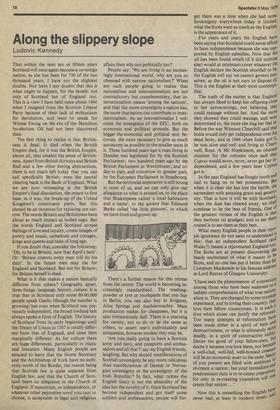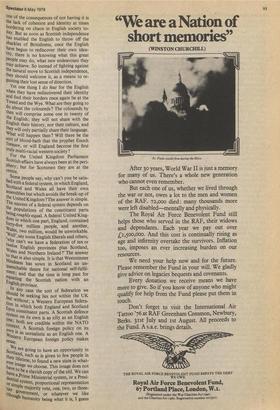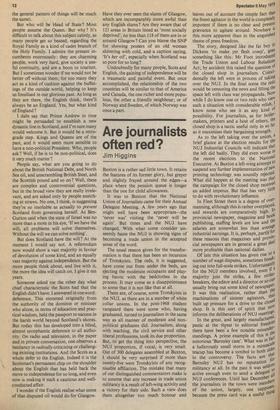Along the slippery slope
Ludovic Kennedy
That within the next ten or fifteen years Scotland will once again become a sovereign nation, as she has been for 750 of the last thousand years, I have not the slightest doubts. Nor have I any doubts that this is what ought to happen, for the benefit not only of Scotland but of England too. This is a view I have held since about 1966 when I resigned from the Scottish Liberal Party because of their lack of enthusiasm for devolution, and went to speak for Winnie Ewing on the eve of the Hamilton by-election. Oil had not been discovered then.
The first thing to realise is that Britishness is dead. It died when the British Empire died, for it was the British Empire, above all, that created the sense of Britishness. Apart from British Airways and British Rail and a few other boring abstractions, there is not much left today that you can call specifically British : even the central clearing bank is the Bank of England. What we are now witnessing is the British Empire's final dissolution, the return to first base, as it was, the break-up of the United Kingdom's constituent parts. But this should be an occasion for rejoicing not sorrow. The words Britain and Britishness have about as much impact as boiled sago. But the words England and Scotland arouse feelings of love and loyalty, create images of poetry and music, cathedrals and cottages, kings and queens and tales of long ago.
If you doubt that, consider the following : 'Oh, to be in Britain, now that April's here'. Or: 'Britain expects every man will do his duty'. In the future men may die for England and Scotland. But not for Britain; for Britain herself is dead.
What is it that makes a nation basically different from others? Geography apart, three things: language, history, culture. It is true that in Scotland only some 80-90,000 people speak Gaelic (though the number is growing) but even when Scotland was previously independent, the broad lowland belt always spoke a form of English. The history of Scotland from its early beginnings until the Treaty of Union in 1707 is totally different from that of England, and since then marginally different. As for culture there are huge differences, particularly in music and literature. Many English people are amazed to learn that the Home Secretary and the Archbishop of York have no authority north of the Border, the reason being that Scottish law is quite separate from English law, and that the Church of Scotland bears no allegiance to the Church of England. If separatism, or independence, or whatever other pejorative word you care to choose, is acceptable in legal and religious affairs then why not politically too?
People say: 'We are living in an increasingly international world, why are you so obsessed with narrow nationalism?' When are such people going to realise that nationalism and internationalism are not contradictory but complementary, that internationalism means 'among the nations', and that the more sovereignty a nation has, the more that nation can contribute to internationalism. As an internationalist I welcome the emergence of the EEC, both on economic and political grounds. But the bigger the economic and political unit becomes, the more necessary to give as much autonomy as possible to the smaller units in it. Three hundred years ago a man living in Dundee was legislated for by the Scottish Parliament; two hundred years ago by the British Parliament in Westminster; and today in part, and tomorrow in greater part, by the European Parliament in Strasbourg.
But the territorial imperative is still strong in most of us, and we can only give our allegiance to what is around us, to the place that Shakespeare called 'a local habitation and a name', to the society that Edmund Burke called 'the little platoon', in which we have lived and grown up.
There's a further reason for this retreat from the centre. The world is becoming increasingly standardised. The washingpowder or tyre or toothpaste that you buy in Berlin, you can also buy in Avignon, Alice Springs and Auchtermuchty. Mass production makes for cheapness, but it is also tremendously dull. There is a yearning for variety, not to do or be the same as others, to assert one's individuality and uniqueness, however modest they may be.
'Are you really going to have a Scottish army and navy, and passports and ambassadors and all that ?' say my English friends, laughing. But why should manifestations of Scottish sovereignty be any more ridiculous than manifestations of Danish or Norwegian sovereignty or the sovereignty of the Irish Republic ? In fact, what tickles the English fancy is not the absurdity of the idea but the novelty of it. Once Scotland has become independent and got itself some soldiers and ambassadors, people will for get there was a time when she had none. Sovereignty everywhere today is limited; what the Scots want as much as the English, is the appearance of it.
For years and years the English have been saying that Scotland could never afford to have independence because she was sal? ported by English subsidies. Now that the oil has been found which (if it did nothing else) would at minimum cover whatever the English declare the Scottish shortfall to be, the English still say we cannot govern ou1. selves, as the oil is not ours to dispose Of This is the English at their most contemPt' ible.
The truth of the matter is that England has always liked to keep her offspring close to her apron-strings, not believing theY could manage without her. And the more they showed they could manage, and were determined to, the more she dug her feet in. Before the war Winston Churchill said that India would only get independence over his dead body, and in 1948 when India got it, he was alive and well and living at Chart' well, Kent. A Mr Hopkinson, an obscure minister for the colonies once said that Cyprus would never, never, never get her in' dependence, and a few years later Cyprus got it. In the past England has fought tooth and nail to hang on to her possessions. But when it is clear she has lost the battle, she surrenders with amazing grace and generosity. That is how it will be with Scotland; when the dust has cleared away, we shairt continue to be the best of friends. One 01 the greatest virtues of the English is the' they harbour no grudges; and to see than routed is to see them at their best.
What many English people in their rnY°' pic ignorance do not seem to understand 15 this: that an independent Scotland land Wales?) means a rejuvenated England too, The Scots are at present discovering the heady excitement of what it means to be Scots, and no one has put it better than Sir Compton Mackenzie in his famous address as Lord Rector of Glasgow University: 'I have seen the phenomenon of conversion among those who have been wakened to sudden comprehension of what true nation: alism is. They are changed by some mystical experience, and in loving their country, theY love their fellow countrymen. It is sa°11" love which alone can justify the reforale'; Too many attempts at reformation had
re
been made either in a spirit of hate a destructiveness, or what is ultimately ' deadly, in a spirit of constructive utiiitYi Desire the good of your fellow-men, blic desire it because you love them, not because a well-clad, well-fed, well-housed creatur, will be an economic asset to the state. Mailt.70 of you present are filled with ambition _A re-create a nation; but your immediate al"; predominant duty is to re-create yourseMou for only in re-creating yourselves will Y create that nation ...'
Now this is something the English hand never had, at least in modern times; an
one of the consequences of not having it is the lack of cohesion and identity at times bordering on chaos in English society today. But as soon as Scottish independence has enabled the English to throw off the shackles of Britishness, once the English have begun to rediscover their own identity, there is no knowing what this great People may do, what new endeavours they may achieve. So instead of fighting against the natural move to Scottish independence, they should welcome it, as a means to regaining their lost sense of direction.
Yet one thing I do fear for the English When they have rediscovered their identity and find their borders once again lie at the Tweed and the Wye. What are they going to do about the coloureds ? The coloureds by then will comprise some one in twenty of the English ; they will not share with the English their history, nor their culture, and they will only partially share their language. What will happen then? Will there be the sort of blood-bath that the prophet Enoch foresaw, or will England become the first truly multi-racial western society ?
For the United Kingdom Parliament Scottish affairs have always been at the periPherY; but for Scotsmen they are at the centre.
Some people say, why can't you be satisfied with a federal system, in which England, Scotland and Wales all have their own assemblies but which avoids the break-up of the United Kingdom ?The answer is simple. The success of a federal system depends on the , populations of the constituent parts being roughly equal. A federal United Kingdomin which one part, England, contained ,, lurtY-five million people, and another, ,Wales, two million, would be unworkable. 'Why can't some English liberals and others, why can't we have a federation of ten or twelve English provinces Plus Scotland, to and Northern Ireland ?' The answer blindness is also simple. It is that Westminster olindness has sown in Scotland an unquenchable desire for national self-fulfilment; and that the time is long past for ejlnattri8 the Scottish nation with an LnglIsh province. In any case the sort of federation we should be seeking lies not within the UK u without; a Western European federation in which both England and Scotland form constituent parts. A Scottish defence system on its own is as silly as an English enue; both are credible within the NATO :ntext. A Scottish foreign policy on its 15 as unrealistic as an English one. A Western European foreign policy makes sense, s_We are going to have an opportunity in ,."3,tiand, such as is given to few people in teheir,lifetime, to found a new state in what11.1 , ver image we choose. This image does not titlave to be a slavish copy of the old. We can dave.a Prime Ministerial system, or a Presioerntiai sYstem, proportional representation de "Plc majority vote, one, two, or three(tkr government, or whatever we like
Hough humanity being what it is, I guess the general pattern of things will be much the same).
But who will be Head of State? Most people assume the Queen. But why? It's difficult to talk about this subject calmly, as many people get so heated, regarding the Royal Family as a kind of cadet branch of the Holy Family. I admire the present incumbents enormously: they are charming people, work very hard, give society a useful continuity, and are a boon to tourism. But I sometimes wonder if we would not be better off without them; for too many they act as a kind of cushion against the buffetings of the outside world, helping to keep us fossilised in our glorious past. As long as they are there, the English think, there'll always be an England. Yes, but what kind of England ?
I dai-e say that Prince Andrew in time might be persuaded to establish a new dynastic line in Scotland, and I'm sure many would welcome it. But it would be a retrograde step. Kings and Queens are of the past, and it would seem more sensible to have a non-political President. Who, people ask ? Well, if he is to be non-political, does it very much matter ?
People say, what are you going to do about the British National Debt, and North Sea oil, and unscrambling British Steel, and the Scottish pound and so on? Well, these are complex and controversial questions, but in the broad view they are really irrelevant, and are asked only by people snatching at straws. No one, [think, is suggesting they're so insoluble as actually to prevent Scotland from governing herself. As BenGurion said when the state of Israel was no more than a mote in his eye, 'If we have the will, all problems will solve themselves. Without the will we can solve nothing'.
But does Scotland have the will ? At the moment I would say not. A referendum now would show a vast majority in favour of devolution of some kind, and an equally vast majority against independence. But the more people think about, and live with it, the more the idea will catch on. I give it ten years.
Someone asked me the other day what chief characteristic the Scots had that the English didn't have. I answered in one word : deference. This stemmed originally from the authority of the dominie or minister who alone, in terms of education and practical wisdom, held the passport to success in the harsh world beyond Scotland's shores. But today this has developed into a blind, almost sycophantic deference to all authority. On radio and television, in the paper and in private conversation, one observes a hesitancy in radically criticising or challenging existing institutions. And the Scots as a whole defer to the English. Indeed it is the Scotsman's permanent chip on the shoulder about the English that has held back the move to independence for so long, and even now is making it such a cautious and wellconducted affair.
I wonder if the English realise what some of that disputed oil would do for Glasgow.
Have they ever seen the slums of Glasgow, which are incomparably more awful than any English slums? Are they aware that of 121 areas in Britain listed as 'most socially deprived', no less than 118 of them are in or around Glasgow ? Can you blame the SNP for showing posters of an old woman shivering with cold, and a caption saying, 'It's her oil', especially when Scotland was so poor for so long?
Undoubtedly for many people, Scots and English, the gaining of independence will be a traumatic and painful event. But once accomplished, the relationship of the two countries will be similar to that of America and Canada, the one richer and more populous, the other a friendly neighbour; or of Norway and Sweden, of which Norway was once a part.




































 Previous page
Previous page